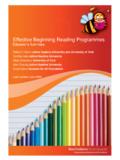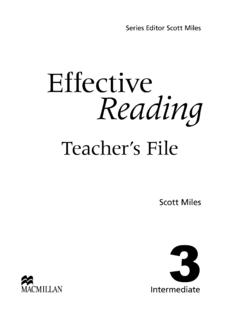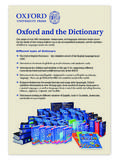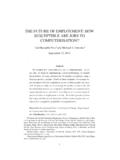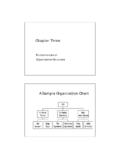Transcription of Effective Programmes in Secondary Reading
1 Effective Programmes in Secondary Reading Educator's Summary Robert E Slavin Johns Hopkins university and university of York Alan Cheung Hong Kong Institute of Education Cynthia Groff university of Pennsylvania Cynthia Lake Johns Hopkins university Last updated September 2008. Students who enter Secondary school with poor literacy skills face huge challenges. They often have difficulty understanding the increasingly complex narrative and expository texts that they encounter in individual subjects. Students' performance on these more difficult texts, which include context-dependent vocabulary, concept development, and graphical information, also provides the strongest indication as to whether or not they will be able to succeed in higher education and the workplace.
2 For many students who read at low levels, Secondary school does provide a last chance to build sufficient Reading skills. Clearly, well-evaluated Programmes capable of enabling such students to meet the demands of complex texts are needed, and remedial Reading courses are becoming more widespread at Secondary level. However, as yet, there is little understanding of which particular Programmes are likely to be Effective for Secondary students, and remarkably a review of all existing research on Secondary Reading Programmes has never previously been done. This review summarises research on Reading Programmes for Secondary students. We looked at all available evidence on Programmes designed to improve Secondary Reading achievement, in order to establish what we know works for students aged 11-18.
3 We examined all studies of Secondary Reading Programmes from all countries, as long as a report was available in English.*. (NB Most studies took place in the US). We were then able to assess and compare the effectiveness of these Programmes . Descriptions and ratings for all the Programmes are listed further down this summary. The review concludes that Programmes which change the way the teacher teaches (instructional process Programmes ), especially those involving co-operative learning, had a positive impact on achievement. The successful approaches also provided extensive professional development. In contrast, the effects of supplementary computer-assisted instruction were small. The full report (which this review summarises) is available at Instructional Process Strategies (IP).
4 (Changing the way the teacher teaches, eg co-operative learning). The largest number of high-quality studies evaluated instructional process Programmes , especially forms of co-operative learning (ES= + in 7 studies). Mean weighted effect size across 14 studies: + Information and Communication Technology (ICT). ( Programmes based on ICT). Studies of ICT find minimal achievement outcomes. Mean weighted effect size across 8. studies: + Combined ICT and Instructional Process Programmes (ICT + IP). ( Programmes that both change how the teacher teaches, and include ICT). Our review showed that positive effects were found for READ 180. Mean weighted effect size across 9 studies: + Combined Curriculum and Instructional Process Programmes (Curr + IP).
5 ( Programmes that both change how the teacher teaches, and include innovative curricula, eg Success for All and Direct Instruction). A randomised study of REACH found an effect size of , and the same study found an effect size of + for RISE. * Overall, 36 experimental-control comparisons met the inclusion criteria, of which 7 used random assignment to treatments. No studies of Reading curricula qualified, but there were 8 studies of ICT, 16 of instructional process Programmes , 10 of combined ICT and instructional process Programmes , and 2 of combined curriculum and instructional process Programmes . Effect sizes were averaged across studies, weighting by sample size. programme Ratings Listed below are currently available Programmes , grouped by strength of effectiveness.
6 Within each group Programmes available in the UK are listed first, and then the remainder in alphabetical order. The type for each programme corresponds to the categories above (eg IP = Instructional Process Strategies). Key to programme Ratings Strong Evidence of Effectiveness: At least one large randomised or randomised quasi- experimental study, plus at least one additional study of any qualifying design, with a collective sample size of 500 students and an overall weighted mean effect size of at least +.20. Moderate Evidence of Effectiveness: Two large studies of any qualifying design or multiple smaller studies with a collective sample size of 500 students, with a median effect size of at least + Limited Evidence of Effectiveness: At least one qualifying study with an effect size of + or more.
7 Insufficient Evidence of Effectiveness: Studies show no significant differences N No Qualifying Studies: No studies met inclusion standards Strong Evidence of Effectiveness None Moderate Evidence of Effectiveness Rating programme Type Description Contact / Website The Reading IP, Co- Students work in teams UK website: Edge operative of four or five to help (Product Learning each other build Reading training provided). skills. They engage in partner Reading , story re-telling, story-related Rating programme Type Description Contact / Website writing, word mastery, and story-structure. Individual assessments are combined for team scores'. Instruction focuses on explicit teaching of metacognitive strategies.
8 Students are grouped according to their Reading levels, rather than by age. Student Team IP, Co- Uses the same structure UK website: Reading operative and design as The (Product Learning Reading Edge, except training provided). that students are grouped by age. READ 180 ICT + IP 90 minute sessions UK/US website: each day include a shared Reading and cts/read180. skills lesson, and computer-assisted Reading , modelled or independent Reading , and small-group instruction with a teacher. Jostens ICT Assessments place US website: students according to their current level. Exercises designed primarily to fill in gaps in their skills are then provided. Teachers are provided with information on progress.
9 Typically used for 15-30. minutes per day, 2-3. days per week. Limited Evidence of Effectiveness Rating programme Type Description Contact / Website Accelerated ICT Accelerated Reader UK website: Reader aims to help teachers (Product training make data-based available). decisions in order to meet the needs of diverse students. Rating programme Type Description Contact / Website Benchmark IP, Teachers receive US website: Detectives Strategy monthly professional development in the use of cognitive and metacognitive Reading strategies across the curriculum. PALS IP, Co- Structured pair US website: operativ learning strategy in e which children take (Teacher manuals can be ordered Learning turns as teachers and through this site).
10 Learners. RISE Curr + IP. Strategy IP, Low-achieving US website: Intervention Model Strategy Secondary school-age students are taught metacognitive Reading strategies, especially paraphrasing, to help them comprehend text. Talent IP, CRS Comprehensive school US website: Development reform model designed Middle School to change school organization, management, curriculum, and instruction. Teachers stay with the same class for multiple years, and are given ongoing professional development. Voyager Passport ICT + IP Voyager Passport combines large and Small group instruction, computer activities, and other elements to create a complete instructional approach. Other Ratings Insufficient Evidence CCC (ICT), REACH (Curr + IP), No contact information available Reading Apprenticeship (IP, Strategy), Talent Development High School (IP, CSR), Xtreme Reading (IP, Strategy), N No Qualifying Studies UK Programmes lacking qualifying studies: Oxford university Press, Reading Tree (Curr) Hodder & Stoughton, Fast Forward (Curr).



